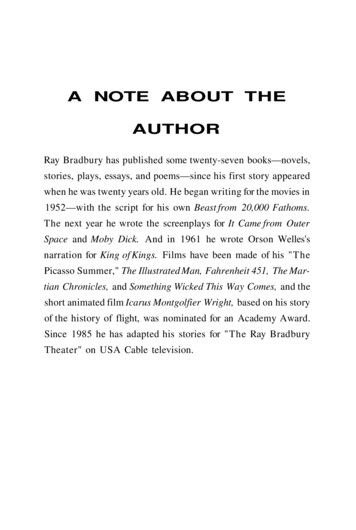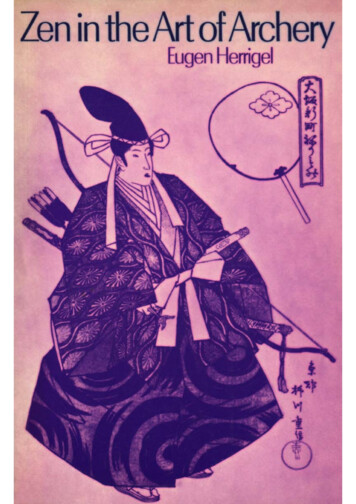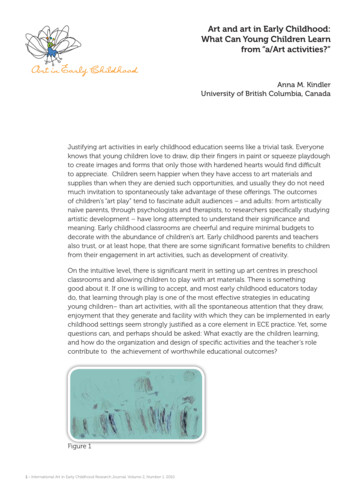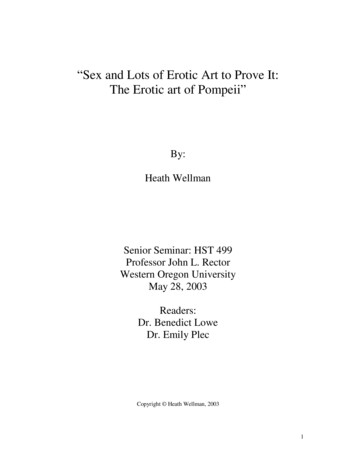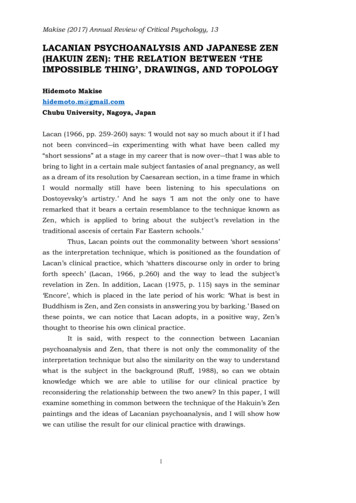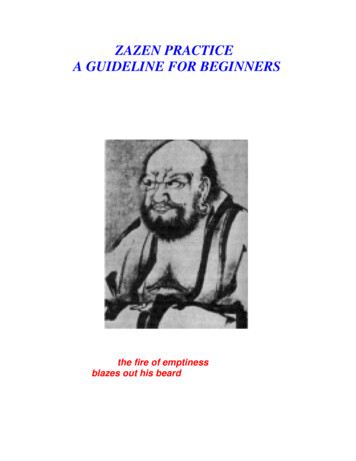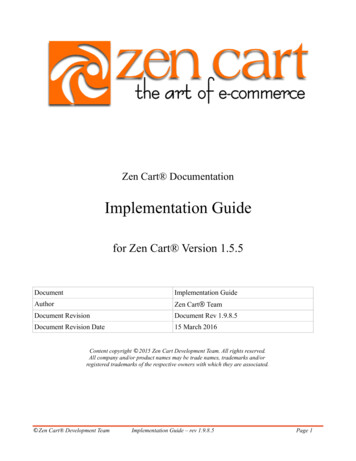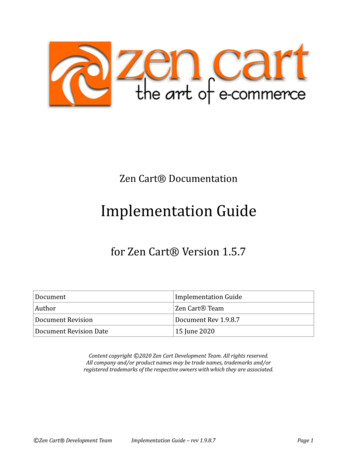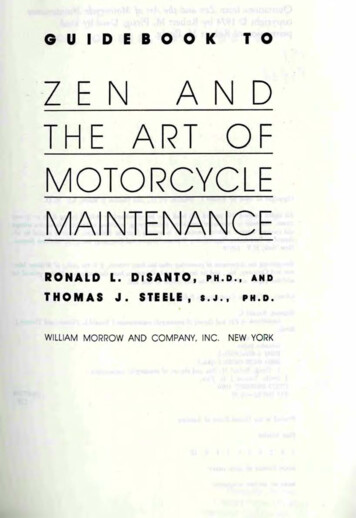
Transcription
GUIDEBOOKTOZEN ANDTHE ART OFMOTORCYCLEMAINTENANCERONALD L. DISANTO, PH.D.,THOMASJ. STEELE. '.J.,WILLIAM MORROW AND COMPANY. INC.ANDPH.D.NEW YORK
knife, the standard instrument of classic Western reason (discuIMIaod exemplified in ZMM, pp. 63-67 aod 223). Altering the.".from packets of information. we might say that the Western part 01the backpack is made up of companments (Reality. Knowledp.and Value) and that the compartments are in tum divided into ndIcategories "as idealism and realism, which are split into su sions, such as naive realism and critical realism. Before you eDID' ine the contents of these compartments, you should be aware of.couple of things.First. dividing philosophy into compartments is rather an bitrary task. Nothing in the nature of humanity requires that be done at all, and nothing in the nature of philosophy or in sillnature of talk about philosophy requires that it be dODe in aactly this way. In a different conten and for different purpa."philosophy might be divided differendy or left undivided. .it has been divided into the basic triad of Reality, Know"and Value simply because that fits in well with the philosophiCUconcerns of ZMM. My hope is to provide a handle onphilosophy that is also a haodle on the philosophies of p and the narrator.Second, our three compartments are not three separate, bted, airtight bins of thought. Questioning in one of the compartments lows into questioning in the other two; an answer in one ofthe compartments has repercussions in the other two. For example, you might ask whether reality is necessarily mind-dependent.i.e. whether whatever exists can only exist insofar as it is presentto some form of consciousness (a question in the Reality companment), and you might go on to ask how an alleged reality thataisted outside the field of awareness of any and every mind couldbe known (a question in the Knowledge comparunent). If youranswer to the Reality question is the idealist answer that everythingreal is real in and for some mind or other, that answer will haverepercussions in the Value compartment. You won't be able-atleast not logically-to think of things as having value in themselves, apart from the activity of a valuing mind.In other words, philosophical thinking flows freely whereverthe desire to understand and the questions generated by that desiretake it. It does not come prepackaged, compartmentalized. Onlytl/ier this thinking has left behind its product5--a proposition or1ft of propositions that asserts and argues for a particular viewcan the comparunentalization occur. A compartmentalizer, whomayor may not also be the original thinker f can then take thesethought products, compare them with others, and say that theypertain to this or that compartment and that they represent this orthat category within the compartment. The compartmentalizermight work with compartments already available or crah someafreshj the person with the knife can slice reality one way orIDOther-or not slice it at all. But neither the carving nor theCOmpartmentalizing should be confused with the original thinkingthat is the hean aod soul 01 philosophy.You might look at this section, with its compartments andCOntents, as a sort of intellectual menu. A menu can list and deSCribe various food offerings in ways that are both infonnativeand tantalizing, but the menu itself is not the meal, and the menutlnnOt guarantee that the food will be tasty, digestible, andDOurishing. That depends upon the match between, on the one d, the food and cooking and, on the other, your palate and gestive system. The following menu of philosophical positionsII bound to leave you feeling empty if you don't taste and chew::;e 01 the intellectual food that's offered, but even the best ofLosophical cooks can"t guarantee a match for your intellectUal.te.1 S 41 S SECTION5A PHILOSOPHICALBACKPACK-WESTERNPHILOSOPHYAs you remove and peruse the Western portion of your philosoplt-ical backpack, perbaps the firs thing you will ootice is the anaiylicwesces
To change the metaphor, yov might look at this section II sort of intellectual map (see the irltroductory part of Section 3). Amap has the advantage of ponableutility, but it offers no substitutefor the freshness of an actual intellectual journey. It can describevarious places and tell you how 10 get to them, perhaps offeriDcmore than one route, but it can't take the place of your choosinca destination or a route, taking me trip, and arriving someplace.Nor can a map predict the satisfaction or dissatisfaction that youwill feel during the trip or upon arrival. Similarly, this sectiondescribes various philosophical positions and some of the reason.tng that has led thinkers to those positions, but it cannot take theplace of your deciding to follow ( nd perhaps extend) or dismiss aparticular line of reasoning, nor can it predict what might happeaif you sample an unfamiliar way of thinking.When intellectual mapping activity and its products are con.fused with or substituted for actwl intellectual journeying, something very important is lost. Flesh and blood people likePhaedrus who try both to penetrate the mystery of life and makesense of their own lives-philosophers in the original sense, "lov.ers of wisdomU-are replaced by professional philosophers, specialists in abstract thinking who by their proficiency have earneda badge that can be worn or removed as the occasion demands.("What do you want to be when you grow up?" "I want to bea philosopher." "I think I know a place where you can get thatbadge. U). And just as a way of thinking is divorced from a wayof living, so the resultant thought products-in the form ofwritings-are divorced from both the living and the thinking,and those who develop the skill of inspecting, naming, and da!"sifying those thought products .uso usurp the name "philosophers, U thus effecting a further degradation of the name. ("Whatdo philosophers do?" "They in"l'estigate and classify the philO'"sophical residue of other philosophers." "I think you've juscgiven a 'circular definition: " "Good point. I think you'd makea good philosopher.")I think it's important here, beiore the mapmaking and the mapreading begin, to draw attention to the difference between philos"ophy as a way of life, a life centering on the search for wisdom, andphilosophy as badge-earning activity, activity that demonstrate'either the ability for high-powered abstraction or the ability toanalyze and categorize the philomphical .residue of others. Thepoint is not that one i b d and e other good-Q ality an showitself in both. The POlDt IS that, If both are to flOUrIsh, philosophyas badge·earning activirw.hould not be allowed to masquerade asphilosophy pure and sin1lt1e. Calling attention to the distinctionbetween a map and a journey is one small effort in the direction ofpreventing the masquerade. Mapping activity can stimulate an intellectual journey and point to a philosophical way of life, but it isDot in itself either one, and it can just as easily-perhaps moreeasily-point to and participate in philosophy as badge-earningactivity.I do not mean to suggest that mapping activity is worthless.That would be to trivialize in advance what I am about to do.("Poisoning the well"-in this case, my own-is what a "goodphilosopher" might call it.) I just want to warn against a costlyconfusion-and perhaps also protect myself against the invective ofPhaedrus. Phaedrus, you will recall, had angry words for thoseprofessional academicians who followed in the footsteps of Aristotle the Mapmaker, not the harder-to-find Aristotle the lourneyer. These professionals have reduced teaching and learning tonaming and classifying and have thereby "smugly and callouslykilled the creative spirit of their students" (ZMM, p. 325). Suchteachers might have been less prone to murder had they been morealive to the distinction between a map and a journey. Perhaps myemphasizing the distinction will call off the wrath of Phaedrus.Perhaps it will also modulate the voice of another ghost that youmight hear in what follows, "the ghost of Aristotle speaking downthrough the centuries-the desiccating lifeless voice of dualisticreason" (ZMM, p. 326).If you do experience a little desiccation from the carving, labeling, and compartmentalizing that follows, perhaps you will findrelief in the flowing waters of the dialogue that appears as the finalp?nion of this philosophical backpack. While the intellectual techruque of naming and classifying, in philosophy and elsewhere, goesback to Aristotle, the dialogue as a mode of philosophical disCOurse goes back to Aristotle's teacher, Plato. I think it's quite tting that this baCKpack conclude with the mode of discourseavored by "the essential Buddha-seeker" rather than with themode favored by "the eternal motorcycle mechanic" (see ZMM, p.ll.1}-after all, ZMM concludes with the return of Phaedrus to thedriver's seat.1 161 I 7
REALITYWhen you ask broad questions about reality, you have entered thearea of phil.pby known as metaphysics. The word itself .coined by Aristotle's followers sometime after AristOtle'sdeadI.iwhen it was used as the title for a particular set of AristotJe'e.treatises. Why it was called Metaphysics is open to question. 0speculation is that the title originally referred to the location of Ibework within the collection of one of Aristotle's followers (Ad.rcmieus of Rhodes). Since this set of Aristotle's ueatises was located 011the shelf Clafter" (meta in Greek) a work that dealt with "na (physica in Greek), the set was called Metaphysica. Another speculation is that Aristotle's followers coined the word as a wayofsaying that the treatises, because of their greater abstraetDell,should be studied only after the treatises dealing with nature. It.third speculation is that the title was meant to indicate that . .treatises went intellectually ubeyond"-meta means "beyond" well as uaher"-the work on nature. Whatever the motivaciaabehind the title, the book that was gathered together under the ddtraised questions that cut wide and deep. It asked about the r.-damental principles, the causes and constituents, not simply of dIitior that sector of things, but of all things, of whatever is, of " .as a whole. Ever since the time that Aristotle's wide-ranging booiwas given its title, metaphysics has been the area of philosophy iawhich the broadest questions about reality are asked. As was stIteclearlier, the work "metaphysics" has also come to be associa&ellwith the occult, with strange, seemingly inexplicable pheno that go beyond what is ordinarily considered natural. When . .word "metaphysics" is used in ZMM it is used in the AristocdiID.not the occult, sense.Here are some examples of metaphysical questions: Whatnature of reality? Is all reality of one basic kind? What is it? If thaeis more than one kind, how many kinds are there and what .they? If mind or consciousness is a basic principle, how basic is idCan there be any reality that is nOt contained in a mind? Is thereone source or more than one source for all the things that are? Ifthere is one source, does that source have an existence that iJindependent of all the things that come from it, or has it somebo1rentered into all the things that come from it, or is it somehow bodIindependent of (transcendent) and present within (immanent) chithings that come from it? If there is more than one source, what iIis a,the relation between or among them? Are they on the same level,or is there a hierarchy? Are they antagonistic or cooperative?Whatever the source or sources, are they subject to change in anyway or are they absolutely immutable? Is change real or illusory?Is pennanence real or illusory? Are the many things of our experience really many or are they really one? Are they both one andmany? Why is there anything at all rather than nothing?As you can see, these are nOt the questions that you typicallytake along with you to spark a conversation at the hair salon. Whyin the world would anyone ever ask them? One answer is thatpeople ask them because they can, just as they climb the mountainbecause it is there. Another answer is that sometimes a crisis thatremoves a taken-far-granted sense of security brings on a metaphysical search for a new basis of security. If, for example. you areused to thinking of the gods as the immortal sources of everythingelse and you begin to lose faith in the existence of the gods, youmay begin to search for some other pennanent reality or realitiesthat explain what is. According to the narrator's reading (ZMM. p.336), this is how metaphysical speculation got started in ancientGreece.REAL OR IDEAL?Is reality "real" or "ideal"? That may seem like a strange question!O ask,but it is not so strange if you know what the tenns "realand "idealism" came to mean in the history of Western philosophy. At the outset, you should note that the philosophical useof those terms is quite different from that found in everyday conversation. In everday conversation, we might say that a personwho knds to be a bit cynical about the purity of human motivationor who at least is very practical and down-to-eanh is a "realist, 1J1Vbereas a person who tends to believe the best about people or1Vho, in any case, strives to reach and maintain the highest standards is an "idealist." This is not the distinction that Westernphilosophical mappers have had in mind.ha To become clear about the philosophical distinction, you firstve to understand what is meant by "mind." A mind is a center onsciousness or awareness. As you read this section, various. gs may enter your awareness: the texture and coloration of thepruned page, meanings of words and phrases and statements, queslSDl" a,
tions about what I'm driving at and what difference that miPImake. and so on. Those things are "in" your mind-mental CODtents. If you reflect upon the awareness that somehow holds them.you arc reflecting upon your mind. Notice that in doing
mode favored by"theeternal motorcycle mechanic" (see ZMM, p. dri ll.1}-afterall, ZMMconcludes with the return ofPhaedrus to the ver'sseat. 1 I 7. REALITY When you ask broadquestions aboutreality, you have enteredthe area of phil.pby known as metaphysics. The word itself . coined by Aristotle's followers sometime after AristOtle's deadI.i when it was used as the title for a particular set of .

